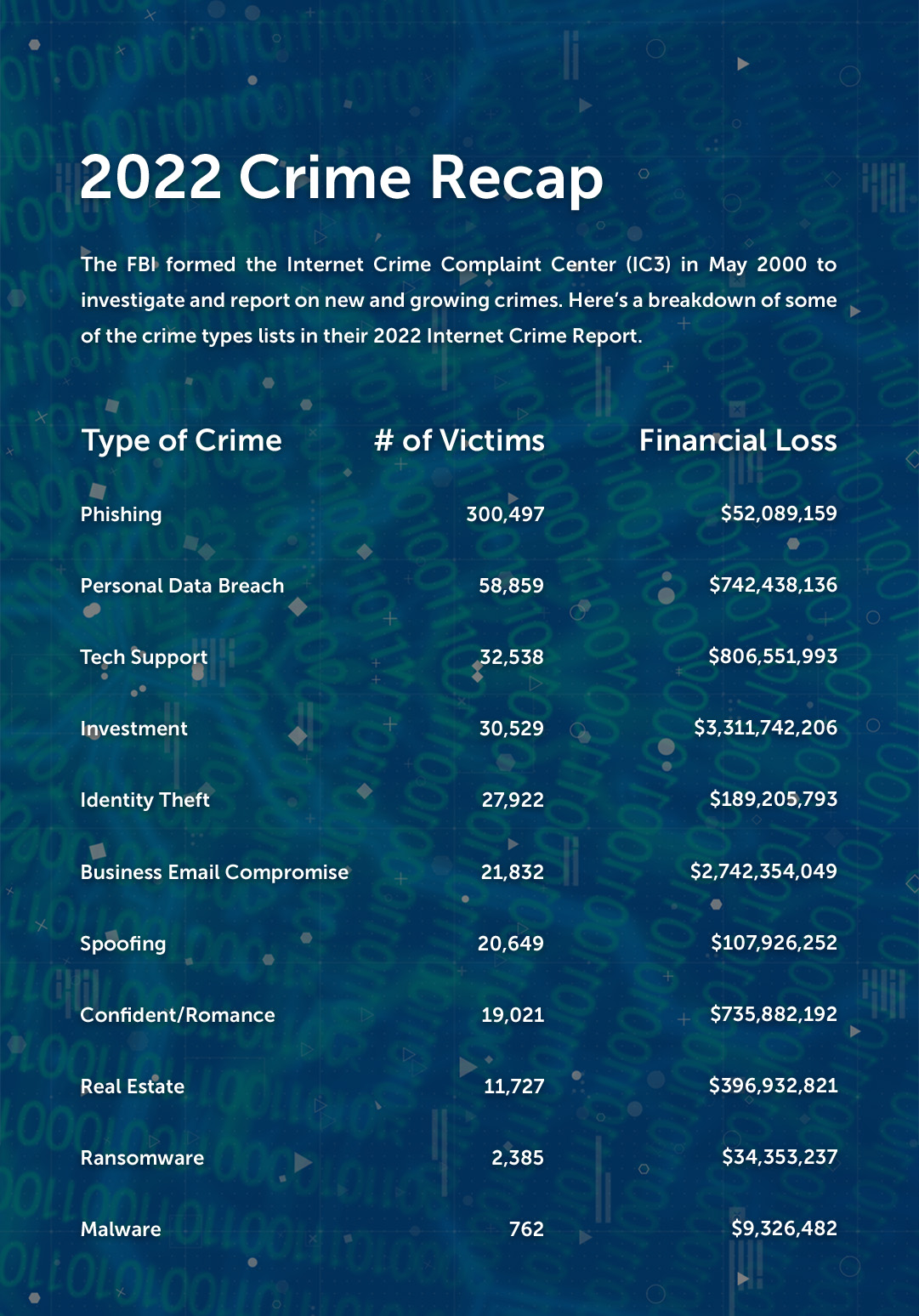
FBI: New & Evolving Internet Crimes Cause Record Financial Loss

Phishing may sound like a foreign language or one of the latest dance moves, but according to the Federal Bureau of Investigation’s (FBI) latest Internet Crime Report, it’s the leading crimes of the internet. It’s a word you need to become familiar with because anyone using a computer or smartphone could join the 300,497 victims who lost over $52 million to these crimes in 2022. Business Email Compromise (BEC) – one way that phishing can transpire – cost businesses and consumers over $2.7 billion.
This blog explores these crimes in more detail to help you avoid becoming another statistic – especially if you’re involved in a real estate transaction.
Why Are These Crimes on the Rise?
The reason is simple. More people than ever are online and deception is much harder to spot than it used to be. These days, cybercriminals are more likely to contact you pretending to be someone you actually know, like a family member, friend, coworker, or someone you’re doing business with. Cybercriminals can find your contacts by hacking into unsecure email accounts, searching the internet or public records, and browsing your social media accounts, then trick you into giving out financial information or login credentials they can use to steal data or funds.
Savvy cybercriminals changed their approach during the COVID-19 pandemic. They take advantage of remote work environments and supply chain issues to execute virtual meeting scams, exploit job recruitment websites, commit invoicing fraud and more.
Terms & Tactics
According to the FBI, each crime below targets a different form of communication, but all are designed to trick you into giving cybercriminals information they shouldn’t have access to. That includes personal and financial information and login credentials they can use to steal your data or funds.
- Phishing – These scams target email, often using spoofing techniques (slight variations on legitimate email addresses) to fool victims into thinking fake accounts are authentic.
For example, they may send email from an address like this: jane.doe@oldrepubictitle.com (where the name of the company is slightly misspelled, but the difference is often undetected by many recipients) instead of using the legitimate email address: jane.doe@oldrepublictitle.com.
BEC, which targets business emails, is a phishing scam designed to dupe the email recipient into performing the unauthorized transfer of funds.
Phishing has evolved and now has several variations that use similar techniques:
• Vishing – These scams happen over the phone, voice email, or VoIP (voice over Internet Protocol). Bad actors call claiming to represent a legitimate business but provide a fake phone number or website so they can intercept your funds.
• Smishing – These scams target SMS (text) messages, often by enticing recipients to click on a link. Doing so can download malicious code onto your phone, which could damage or disable it.
• Pharming – Not to be confused with real estate farming, these scams occur when malicious code is installed on your computer to redirect you to fake websites. Cybercriminals hope you don’t notice, so they can steal your account number or password when you attempt to log on.
2022 Crime Recap
The FBI formed the Internet Crime Complaint Center (IC3) in May 2000 to investigate and report on new and growing crimes. Here’s a breakdown of some of the crime types listed in their 2022 Internet Crime Report:

*Regarding ransomware adjusted losses, this number does not include estimates of lost business, time, wages, files or equipment, or any third-party remediation services acquired by a victim. In some cases, victims do not report any loss amount to the FBI, thereby creating an artificially low overall ransomware loss rate. Lastly, the number only represents what victims report to the FBI via the IC3 and does not account for victim direct reporting to FBI field offices/agents.
Key Findings
- Americans filed 800,944 complaints of internet crime in 2022.
- Financial loss from all forms of internet crime exceeded $10.3 billion.
- Phishing was the most reported cybercrime type with 300,497 reported incidents.
- The FBI received 21,832 BEC complaints with adjusted losses over $2.7 billion.
- Ransomware accounted for 2,385 complaints with recorded losses of $34.3 million.
- Cryptocurrency investment fraud rose from $207 million in 2021 to $2.57 billion in 2022, an increase of 183 percent.
Real Estate Transactions
It’s worth noting that IC3 created a category just for real estate crimes because the fraud and loss associated with these transactions is so high. Real estate deals are appealing to many cybercriminals because of the large payout. They also know that closing on a home can be a stressful time for consumers, who may not question any last-minute changes to wiring instructions that appear to come from someone handling their transaction.
Whether you are a real estate professional, a title agent, or a consumer, it is vital to remain vigilant throughout the entire transaction. Closing agents should communicate clearly and upfront to all parties about how the closing and funding processes will occur.
REMEMBER:
- Changes to wire instructions are RARE.
- Always verify any changes BEFORE wiring funds.
- Use a TRUSTED phone number to verify changes. NEVER use phone numbers that appear in unsolicited communications.
Cybersecurity Resources
Own a business in the Title or Real Estate Industry? Learn more about how to protect it in Five Common Threats to Business Cybersecurity on Old Republic Title’s Company blog. Want educational materials to share with your customers? Check out our Wire Fraud Prevention Flyer and Beware of Wire Fraud Flyer. The American Land Title Association also offers a template for responding to cybersecurity incidents.
Consumers can take an active role in protecting themselves from internet crime. To learn about the latest scams and warnings, visit IC3’s Consumer Alerts page. You can also explore our other tips to spot phishing attempts, prevent wire fraud and respond to suspected wire fraud.
Prior Articles
Commercial Snapshot Q1 2025
Commercial Market Snapshot Q1 2025 March 5, 2025MARKET OVERVIEWThe fourth quarter of 2024 marked a return to positive and broad Commercial Real… Read More »
How Hybrid Work is Changing the Office Sector
How Hybrid Work is Changing the Office SectorBy 2025, hybrid work is projected to be the dominant work model for many companies across the nation.… Read More »
Commercial Snapshot Q4 2024
Commercial Market Snapshot Q4 2024December 4, 2024MARKET OVERVIEW The third quarter’s performance was better than expected and market sentiment… Read More »
10 Easy Tips to Create a Healthier Home
10 Easy Tips to Create a Healthier HomeCreating a healthier home is a vital step to enhancing your overall well-being. Your living environment can… Read More »
7 Reasons Homeowners Need Title Insurance
7 Reasons Homeowners Need Title InsurancePurchasing a house is a momentous occasion and likely one of the biggest purchases you’ll ever make.… Read More »
Economic Update Q2 2024
Economic Update Q2 2024July 11, 2024Although a lack of rate movement by the Federal Reserve (The Fed) postponed the real estate markets’… Read More »
The FAQs of Title Insurance for Homeowners
The FAQs of Title Insurance For HomebuyersFor most of us, a home is the largest investment we'll make in our lives. To buy with confidence,… Read More »
Why Title Insurance?
USAAdvisor MortgagesAdvertiser DisclosureWhat Is Title Insurance And Do I Need It?Amy FontinellePersonal Finance ExpertReviewedChris JenningsDeputy… Read More »
Navigating the Current Housing Market
Navigating the Current Housing Market: Finding the Brighter SideDecember 20, 2023If you’ve been following the housing market, you’… Read More »
Email Impersonation Fraud
Email Impersonation Fraud: A Growing TacticEmployees and customers alike beware! Email impersonation is on the rise – and hackers are constantly… Read More »